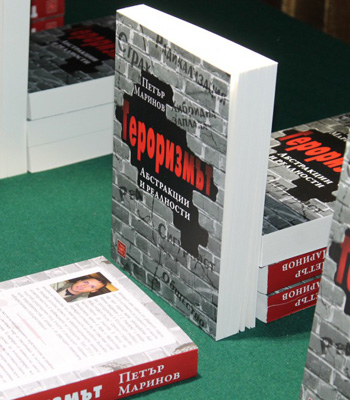That question has been asked across Europe from Madrid to Istanbul and from London to Nice. The latest book named Terrorism - Abstractions and Reality give many answers about the nature of terrorism and the dissemination of that phenomenon. The author of the book lieutenant-colonel Dr Petar Marinov has over twenty years of experience in the country's security system and has taken part in missions of the Bulgarian Armed Forces in Iraq and Afghanistan. In his words, terrorism is the new type of war not only in Europe, but in all parts of the globe. Unlike the conventional warfare, terrorism does not respect any international legal norms. On the contrary, it has a very asymmetrical approach and the actions are usually held against the rules.
 What is the purpose of the terrorist attacks in Europe?
What is the purpose of the terrorist attacks in Europe?
“In my view, the main purpose of those terrorist attacks is to undermine confidence in the public system and in particular in the security system. As a result, the local economies weaken due to the transfer of resources from other fields to the security system. Secondly, the democratic rights and freedoms of the citizens are restricted, distrust between different ethnical communities rises, which results in higher ethnical intolerance. The terrorist actions often change the general policy of given states.”
It is difficult to determine the social and psychological profile of the terrorist, but the latest terrorist attacks outline a new type of profile.
“European citizens who are second or third generation migrants have a feeling of unfair distribution of the welfare. They also feel that society treats them differently. Those are mainly young Europeans who grew up in a very capsulated environment which favored their radicalization and meanwhile made them susceptible to manipulations. It is very difficult to identify those people, which is a big challenge to the security system.”
The social networks and even media contribute a lot to their radicalization. They become a very strong instrument in the hands of the terrorists who use them to fill people with fear and mistrust.
Europe can successfully oppose that asymmetrical threat through establishing a flexible security system, integrating the people from capsulated communities and boosting the role of the formal religious institutions. The countries should also make adequate campaigns with regard to the democratic values of modern society. More from lieutenant-colonel Marinov:
“Education is the most successful instrument against terrorism. I spoke with religious officers in Afghanistan who told me that the Taliban managed to attract so many young boys due to their low literacy. If people go to school, they can read themselves what is written in the holy books and they would not need someone else to reproduce information for them. ”
Are there any internal and external threats to this country’s national security?
“The integrity of the state is not threatened. However, the main purpose of terrorism is to undermine the pillars of the society and lower the confidence of the citizens towards the public institutions, which poses a threat to the national security. The Bulgarian authorities have undertaken concrete actions. Several days ago the National Assembly adopted at first reading the Counter-Terrorism Act. I suppose that this act will further improve in the future. This is a very good start towards the establishment of a more flexible security system, which will be capable of counteracting asymmetrical threats”, Petar Marinov concluded.
English version: Kostadin Atanasov
The National Museum of Natural History at the Bulgarian Academy of Sciences (BAS) is inviting visitors to Researchers' Night (Night of Scientists) on 26 September. From 17:30 in the museum foyer at 1 Tsar Osvoboditel Boulevard, Professor Zlatozar Boev..
From 26 to 28 September, the historical Bulgarian capital Veliko Tarnovo will host the first-ever national festival of organic produce in the Marno Pole Park. The National Bio Fest 2025 is a large-scale exhibition of certified Bulgarian organic..
A major project to produce a feature film about the life and career of legendary Bulgarian footballer Hristo Stoichkov was presented on Wednesday, state news agency BTA reported. The premiere is scheduled for late 2027. The creators said they aim..
The Sofia Zoo has a new resident – an 11-year-old male snow leopard, BNT has reported. He comes from Nordens Ark Zoo, located in..
Researchers from Bulgaria and abroad are gathering in Sofia for a scientific conference. The forum will be held on October 16 and 17 in..
"Folklore is a need for humans and this need will not disappear just like that, " says Assoc. Prof. Dr. Natalia Rashkova -..

+359 2 9336 661
